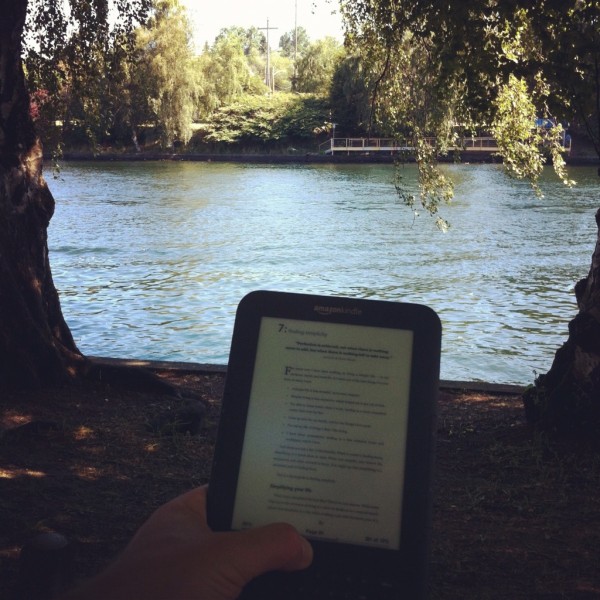I think a lot about focus, what it means, and how to find it. Focus is something that does not come naturally to most people and can be very difficult when you live an over-connected lifestyle. It’s something that you have to commit to, practice, experiment with, and make a priority. I think Leo Babauta of Zen Habits has some excellent thoughts on the subject which he compiled into a free ebook called, appropriately, “Focus.” I read it and wanted to share my thoughts on the subject. That’s me below, reading it with my phone on.

As soon as I started working for myself, I understood the importance of focus. It took running a business, though, to really make the time to start building a system that works for me. Like all good processes, this system is a work in progress and I learn something useful every day.
One of the things I learned, quite recently in fact, is that your attention is very limited and your life consists, literally, of the things that you pay attention to. This has lead me to drop books if they bore me, rarely subscribe to new feeds of information, and only recommend stuff I really enjoyed.
Case in point, the ebook “Focus.” I read through this succinct, helpful piece in what amounted to a couple of hours, mostly because it was short (121 well-spaced pages) but partly because a lot of it identified actions that are already a part of how I work. I wanted to write a quick review/summary to share my thoughts on the subject and maybe help you find focus as well.
I feel that it’s important to say… The words below are mostly my own, inspired by this ebook. Some things are my interpretation, some are almost direct quotes, and some are just things that occurred to me while reading. Disclaimer complete!
Section 1: Step Back
- If you think you live your life free of significant distraction, you’re fooling yourself
- You’re distracted because a connected life is distracting, not because there is something inherently wrong with you
- It’s easy to underestimate how damaging and all-encompassing this distraction can become
- Our culture makes fighting or rejecting this distraction hard; the people around us perpetuate a certain lifestyle by demanding instant response
- Focus is immensely important for creation; continuous distraction destroys creativity and happiness
- Getting meaningful work done requires having separate times to create, consume, and communicate
- Regular disconnection is not just a good thing to do now and then, it’s vital for your mind and your work. Disconnection can be very hard at first but gets easier with practice.
- Disconnection doesn’t just happen, you have to actually do it. Set a time and turn everything off: web, phone, work, everything.
- I build disconnection into everything I do, though I can always do better. Page 24 had some great hacks to use to force this to happen.
- It sounds a little “woo woo” but building rituals into your routine can be very helpful. Mine is to wake up early, make breakfast/coffee slowly, then start either writing or coding on something non-critical. Once I’m awake and aware, I set tasks for the day, set aside the time to do them, then look at email. 2 – 3 hours might pass before my inbox is opened.
Section 2: Limiting the Stream
- If this is something you’re not doing, you need to read this section over and over until you start. Limiting the stream of things coming by way and batch processing communication has been so so critical to me
- Start small but keep pushing the limits of how unconnected you can be; you’ll be surprised by how much less insane you feel
- Don’t let the stream control you – it will try
- Adjust expectations by responding slower; reject your fear of being out-of-touch by staying humble
- Throttle back email! Put your task list elsewhere (I like Asana more and more each day), religiously practice Inbox Zero (transformative, honestly), and check email no more than once an hour, if that
- Treat distraction like an addiction and treat it like you would any other destructive habit
- Page 50 has a few great tools for beating distraction; my favorite at the moment is OmmWriter
Section 3: Simplify
- This section might fall on deaf ears for some. It’s built into American culture to have “stuff,” get more “stuff,” and hang onto “stuff” for a long time. Simplifying your stuff is a matter of asking yourself over and over, for new things and old, do I need this? Really?
- Cleaning your computer is definitely a critical one. If you’re working on one thing, close everything else besides that one window.
- Do less and slow down. Doing everything for everyone all at once is not only really unproductive in the long run, it’s also unhealthy and will never lead to your best work.
- Go with the flow. So much easier said than done. Re-frame the negative to find the positive.
- Effortless action: starts on Page 72. This was a brand-new concept for me and the biggest take-away from this book. Read this once or twice and, if it doesn’t make sense, put all of the above into practice and then come back to it.
- Prioritize by reducing the number of tasks, choosing carefully and passionately, and concentrate on that task until it is complete or has at least bee pushed forward. Simple words, huge impact.
- Let go of your goals. Powerful idea that runs contrary to much of what you’ve probably heard. As soon as I read that, I understood what it meant. I did this subconsciously a while ago and come back to it all the time. Goals are something you strive towards, reach, and then reset. Where does satisfaction and relaxation and reward come in if all you’re doing is re-setting goals? Think on that…
- Learn to say “no.” There’s a right and a wrong way to do this.
Section 4: Focus
- Make sure you’re working on “something amazing.” What’s funny about this thing is that it can be anything and it doesn’t have to be career/business/profession related at all. Just think about something you’ve been meaning to do or learn and choose it. Then, on a daily/regular basis, clear everything around you and just work on it.
- Practice single-tasking. Multi-tasking is complete bullshit, there’s no such thing. Merlin Mann put it best: multi-tasking is simply the best way to do many things terribly at once. As soon as you start answering an email while on a conference call, you should be asking yourself how necessary are these two things if you can do both at once.
- Here’s the system in its most simple form: turn off all distractions and notifications; clear away everything physical around you not related to the task at hand; commit to either a realistic stopping point or a period of time; put on some music; do your thing and enjoy it; if you have a thought or idea or task, keep a pad nearby and just scrawl it down instead of getting distracted and breaking out; take breaks and change positions.
- Go for walks often. Alternatively, buy a bike because it’s way better than walking. Page 102 starts a great section comparing walking during vacation with a potential work situation. Sounds sublime and I read it after taking an impromptu walk to the Ship Canal (see above)
There is a 5th section but it’s not for everyone and I kind of skipped through it.
Hopefully you were able to focus and glance through this. I think finding focus in your life is more important than almost anything else, especially if your work involves being connected all of the time.
I asked my Facebook group how they find clarity (which branched into focus) and here are a few things they had to say:
- “Reflection time, fresh air, and natural light. There never seems to be time to reflect. It’s seems we’re always ‘doing’ and rarely ‘thinking'”
- “Yoga, meditation, writing… and giving myself space to just THINK each day, or week … focusing on one thing at once (doing the dishes and focusing on doing the dishes, working and focusing on the project at hand). Setting aside time to plan, review and check-in. Having ritual for the start of work and for the close of work. Building in time to review and communicate and … reflect.”
- “Mindfulness in being in the present moment. Do you remember that time 5 years ago when you were extremely upset? Does it really matter now?”
- “Stepping outside close to nature, meditate, run, and walk. Observe, people are fascinating, and by observing you reach understanding and clarity. Again, step away and observe from a distance, events seem to be much clearer from that perspective. An organic clean diet helps me bring clarity. Use the ‘would it matter in 2/5/10 years’ rule to evaluate decisions. And most importantly shield yourself from toxic chaotic environments, you DO have a choice.”
Your turn. Do you make focus a priority? Tell me about the tricks and hacks you use or tell me your plan to do more.
< Take Action >
Comment via:
Subscribe via:
< Read More >
Tags
Newer

Feb 13, 2013
Tips, tricks, and advice for visiting Paris
These are a few things that we found and enjoyed in and around Paris during our 2 month stay there in 2010.
Older
Aug 07, 2012
Don't Screw Around with Your Finances
What if there was someone you could talk to for an hour and get definitive answers to the questions above and a lot more?